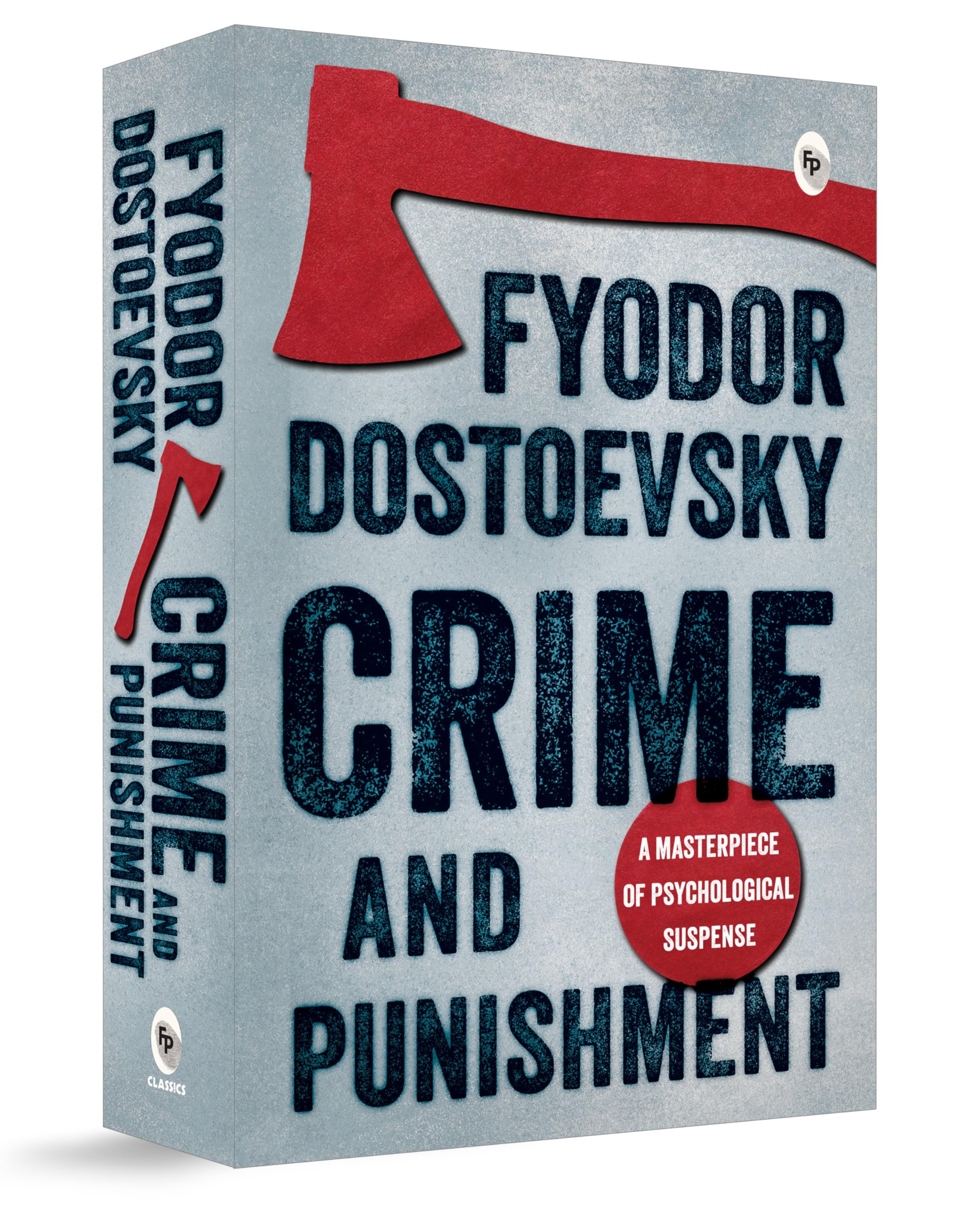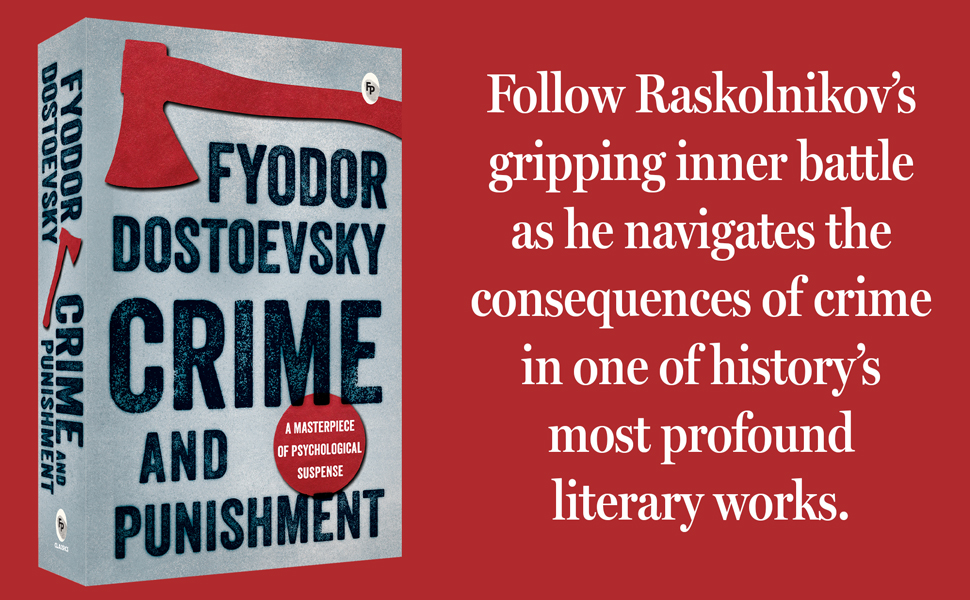Customer Services
Copyright © 2025 Desertcart Holdings Limited


📚 Own the literary legend that shapes minds and sparks debates
Crime and Punishment by Fyodor Dostoyevsky is a critically acclaimed psychological novel ranked #277 in Books and top 5 in multiple fiction categories. It comes securely packaged, making it a perfect gift, and is crafted for durability to ensure long-term enjoyment. With over 15,800 reviews averaging 4.5 stars, it remains a must-have for discerning readers seeking profound philosophical and literary depth.



| ASIN | 9386538059 |
| Best Sellers Rank | #596 in Books ( See Top 100 in Books ) #4 in Military Fantasy (Books) #5 in Historical Fiction (Books) #12 in Crime Fiction (Books) |
| Country of Origin | India |
| Customer Reviews | 4.5 4.5 out of 5 stars (15,834) |
| Dimensions | 12.7 x 3.3 x 20.32 cm |
| Edition | Deluxe |
| ISBN-10 | 9789386538055 |
| ISBN-13 | 978-9386538055 |
| Importer | Prakash Books India Pvt Ltd |
| Item Weight | 480 g |
| Language | English |
| Net Quantity | 1 Count |
| Packer | Prakash Books India Pvt Ltd |
| Print length | 584 pages |
| Publication date | 10 August 2017 |
| Publisher | Fingerprint Publishing |
| Reading age | Customer suggested age: 16 years and up |
J**H
A Sublime Enigma
Crime and Punishment is a beautiful but a grim story of Rodion Romanovitch Raskalnikov, an impoverished student who had to interrupt his studies for poverty. Young Raskalnikov is a man of philosophic temper and thinks there are ordinary people who are (to be) governed by law and extraordinary people, like Napoleon, who have a right to transgress, at least for the good of the humanity. He writes a brilliant article delineating his philosophy. But he is living in rags and can't continue giving lessons in such wretched condition. He kills Alyova Ivanovna, an old pawnbroker who charges extortionary interest, and her sister Lisaveta who incidentally and unexpectedly arrives at the scene of crime, because he thinks it is good for humanity. The rest of the story is a psychological study of his conduct as he tries to hide his crime from police who have a strong suspicion of his crime. He is almost out of his mind after the murder. His friend and doctor both think he has gone mad. He fails to collect cash from his victim's room after the murder. He faints at the mere mention of the murder when he is summoned to police office for recovery of room rent on which he has defaulted. He comes in contact with some of the police personnel who happen to be acquaintances of his friend Razumihin and almost betrays his secrets included how he hid the few valueables he looted. He remains tense and alternates between clear faculties and insanity. Finally when it is clear that police is likely to arrest him anytime, he confesses even though he knows that police doesn't have enough proof to get a court conviction, particularly because another suspect has already confessed. He is convicted and sent to prison in Siberia where Sonya follows him. His charcter is enigmatic like Monalisa smile and it is difficult to conclude if he has truly repented or continues to justify his theory and his entitlement to transgress law. There are some sub plots. He is benevolent and helps the family of a poor acquaintance who has died in road accident by giving all the money he received from his mother for funeral arrangements. He rescues his sister from two middle aged rich suitors, one (Petrovich) whose matrimonial proposal she has accepted to help her mother and brother and the second (Svidrigailov) who had evil designs on her when she was his house governess and later again when his wife died. He encourages his sister into relationship and marriage with his friend Razumihin. The novel easily counts among the all-time best.
M**R
BUY THIS BOOK ASAP
Very well quality, fully satisfied.
A**A
Good purchase
Amazing purchase. Gripping story .Book quality is also not bad. Recommend!
A**E
Avid Readers Asset in Bookshelf.
Excellent Book for Avid Readers. Must be Displayed in Frontline of Bookshelf.
S**B
Excellent Read
It is not just a crime story but a profound exploration of conscience, justice, and the possibility of redemption—a cornerstone of world literature.
G**H
Psychological thriller
Print quality is good, yet to read book completely. Since I have read Detsovesky's Notes from underground and White nights. I am this is going to be master piece with my initial reading.
E**7
Definitely a must buy !
Great book, good page and print quality but still can't figure out who is the translator?? Is it Constance Garnett ??
K**A
Kindle version is ok
5 stars for the book. But, the kindle version has some typos and this particular translation is not the best. That said, still a great book
J**.
Fyodor Dostoyevsky generally seemed to write books set in the quirky period of time sandwiched in between serfdom and the Communist Revolution in Russia somewhere in the late 19th century. It is a point in time which most people living today could not personally attest to or even have much knowledge about yet it seems oddly familiar in many ways to modern society. It is hierarchical with various classes having obvious advantages over the others yet it wasn't overly strict like a caste system from which one was cemented into a position in society and could not escape. It also had a strong bureaucracy which society seemed to value and hold in somewhat high regard due to an appreciation of the benefits it provides to a society in need of order and discipline while at the same time chafing at the ways in which it stifled creativity and personal freedom. Against that backdrop this book paints a portrait of a young man who commits a robbery and murder which he argues about for a fair portion of the book within his own mind as he lurches back and forth between despising himself and feeling justified in doing it "for the greater good." There is also a fair amount of characters in this book who push and pull the main character from various directions as he processes what he has done and how he really feels about it and someone much smarter than me has probably analyzed if these characters had any symbolic meaning or not, but they seem like an odd mix. The main character is a university student driven to crime by desperation mixed with intellectually inspired notions of class warfare. He meets a man at a tavern who is an alcoholic and befriends him early in the book only to later meet the mans daughter and develop a relationship with her. The woman is somewhat similar to the main character in that she is badly conflicted as well in that she professes to be a Christian yet makes a living as a prostitute due to her family being so desperately poor. She becomes a sort of moral voice for the main character. The main character's sister also appears in town and there is a whole subplot about how she is going to marry a wealthy man to help her family while at the same time being pursued/blackmailed by another man who is obsessed with her only to reject them both for an idealistic third man. There is also a detective who joins the cast at some point and suspects the main character of his crime even though he has little real evidence. He thereafter engages in a psychological game with the main character to break him into confessing. The story also has odd similarities to Doctor Zhivago and the Tell tale Heart. Edgar Allen Poe wrote the Tell tale Heart in the 1840's and FD didn't write this story until the 1860's while Doctor Zhivago was written sometime in the early 1950's but whether any are similar to another intentionally or due to mere coincidence is beyond my knowledge. I am just noting that because I kept thinking about it while I read it and so many of the characters reminded me of characters from there. In any event, the real theme of this book seems to be the conflict between faith and reason. The main character knows things he is doing (or has done) are wrong, but justifies many of them intellectually and politically only to feel conflicted about them. In the end though the book is really about a journey through the process of faith and reason while at the same time offering a commentary of what the author must have perceived as a rise in intellectual and political thoughts and actions at the expense of morality and truth. Perhaps he divined the coming Revolution or maybe the book is not that deep. I really am somewhat uncertain but I know that I enjoyed reading it and each time I read it I end up thinking more deeply about what the author means, what he was thinking and if he was trying to say something I am not yet grasping. All of these to me are good signs that a book is worthy of reading and enjoying.
M**Y
I’m still a new to reading novels, so my opinion may change in the future, but I have say that for one of my first novels to read I feel like I’ve read a master piece! How the characters in the novel are written, makes them feel real and connectable to. The description of the characters, their personalities and the places where events happened is very likable as well. The way I can hear the characters’ thoughts made me sometime feel like I was the person living and thinking that way, as if I were them! onetime I even felt almost going crazy as one of the characters was going crazy! It is in the psychological genre and it does a great job at it, but I would advise to stay away from it if you’re not fond of that genre. As a last note, as a non English native speaker the novel was a little hard to read(I needed to use the translator a couple of times). TLDR; I felt like I read a master piece. It was enjoyable, makes you feel like you are the character him/her self, the way the characters and their thoughts are presented is fantastic and makes them connectable to and makes the reader able to understand them. I liked it a lot, I definitely recommend it to anyone into the psychological genre.
S**S
Great book Nice print
C**U
Great reading A classic
M**R
中学生の時に翻訳版を読んでいます。当時は主人公の「1つの罪は100の善行によって償われる」という考えに唸りました。主人公を応援する心情で読んだものでしたが、今再び読んでみて主人公の傲慢さ、というかただの精神病じゃないかと……。主人公には嫌悪を感じました。大体、綿密に計画し信念のもとに行っているはずなのに肝心のお金はとってこれず、思い切り体調まで崩して情緒すら不安定で。実行前の雄々しさはどこに?まあ主人公がめちゃくちゃな反面、ラズミーヒンの献身が目を引きヒーローとして見守れたのは良かったです。
Trustpilot
2 weeks ago
5 days ago